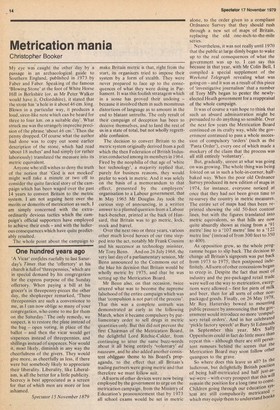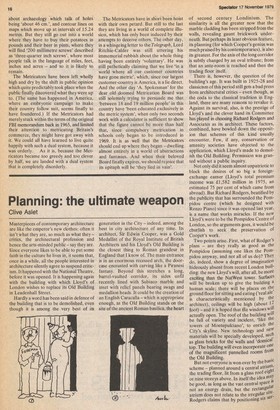Metrication mania
Christopher Booker
My eye was caught the other day by a passage in an archaeological guide to Southern England, published in 1973 by Faber and Faber. Speaking of the famous 'Blowing Stone' at the foot of White Horse Hill in Berkshire (or, as Mr Peter Walker would have it, Oxfordshire), it stated that the stone has 'a hole in it about 46 cm. long. Blown in a particular way, it produces a loud, siren-like note which can be heard for three to four km. on a suitable day'. What struck me was the strangely imprecise precision of the phrase 'about 46 cm.'. Then the penny dropped. Of course what the author had done was to copy out some earlier description of the stone, which had read 'about 18 inches' and had simply (or rather laboriously) translated the measure into its metric equivalent.
Anyone who still wishes to deny the truth of the notion that 'God is not mocked' might well take a minute or two off to consider the quite farcical story of the campaign which has been waged over the past 14 years to convert Britain to the metric system. I am not arguing here over the merits or demerits of metrication as such, I am simply concerned with the extraordinarily devious tactics which the campaign's official supporters have employed to achieve their ends — and with the ludicrous consequences which have quite predictably resulted.
The whole point about the campaign to
One hundred years ago
'A Vicar' confides ruefully to last Saturday's Times that the 'offertory' at his church is full of 'threepennies,' which are in special demand by his congregation for the express purpose of the Sunday offertory. When paying a bill at his grocer's in threepenny-pieces the other day, the shopkeeper remarked, 'These threepennies are such a convenience to me, as I can now oblige so many of your congregation, who come to me for them on the Saturday.' The only remedy, we suspect, is to restore the plate instead of the bag — open voting, in place of the ballot — and then the vicar would get sixpences instead of threepennies, and shillings instead of sixpences. Nor would it, most likely, diminish in any way the cheerfulness of the givers. They would give more, as cheerfully as less, if there were but somebody likely to appreciate their liberality. Liberality, like Liberalism, is all the better for a little publicity. Secrecy is best appreciated as a screen for that of which men are more or less ashamed. make Britain metric is that, right from the start, its organisers tried to impose their system by a form of stealth. They were never prepared to face up to the consequences of what they were doing in Par liament. It was this foolish stratagem which in a sense has proved their undoing — because it involved them in such monstrous distortions of language as to amount in the end to blatant untruths. The only result of their campaign of deception has been to deceive themselves, and to land the rest of us in a state of total, but not wholly regrettable confusion.
The decision to convert Britain to the metric system originally derived from a poll which the then Federation of British Industries conducted among its members in 1964. Fired by the neophilia of that age of 'white hot technology', a majority replied that, purely for business reasons, they would prefer to work in metric. And it was solely on the basis of a memorandum to that effect, presented by the employers' organisation to a Labour government, that in May 1965 Mr Douglas Jay took the curious step of announcing, in a written answer to a planted question from a Labour back-bencher, printed at the back of Hansard, that Britain was to go metric, lock, stock and barrel.
Over the next two or three years, various other much loved heroes of our time stepped into the act, notably Mr Frank Cousins and his successor as technology minister, Mr Tony Benn. And on 26 July 1968, the very last day of a parliamentary session, Mr Benn announced to the Commons out of the blue his decision that Britain would be wholly metric by 1975, and that he was setting up the Metrication Board.
Mr Benn also, on that occasion, twice uttered what was to become the supreme falsehood of the entire campaign which was that 'compulsion is not part of the process'. That this was a complete untruth was demonstrated as early as the following March, when it became compulsory by parliamentary order to sell drugs in metric quantities only. But this did not prevent the first Chairman of the Metrication Board, the delightful Lord Ritchie-Calder, from continuing to utter the same buzz-words about it all being entirely 'voluntary' ad nauseatn, and he also added another consistent obliggato theme to his Board's propaganda, to the effect that all Britain's trading partners were going metric and that therefore we must follow suit.
All sorts of other devices were now being employed by the government to urge on the metrication campaign, from the Ministry of Education's pronouncement that by 1973 all school exams would be set in metric alone, to the order given to a compliant Ordnance Survey that they should rush through a new set of maps of Britain, replacing the old one-inch-to-the-mile series.
Nevertheless, it was not really until 1970 that the public at large dimly began to wake up to the real consequences of what the government was up to. I can say this because in that year, with Mr Colin Bell, I compiled a special supplement of the Weekend Telegraph revealing what was going on — and it was as a result of this piece of 'investigative journalism' that a number of Tory MPs began to pester the newlyelected Heath government for a reappraisal of the whole campaign.
It was of course a vain hope to think that such an absurd administration might be persuaded to do anything so sensible, Over the next few years the Metrication Board continued on its crafty way, while the government continued to pass a whole succession of compulsory 'orders' (such as the 'Pasta Order'), every one of which made a mockery of the claim that the process was all still entirely 'voluntary'.
But, gradually, unrest at what was going on was growing. The whole thing was being foisted on us in such a hole-in-corner, halfbaked way. When the poor old Ordnance Survey produced its new edition of maps in 1974, for instance, everyone noticed at once that they had not been given time to re-survey the country in metric measures. The entire set of maps had thus been reprinted showing the old 50-foot contour lines, but with the figures translated into metric equivalents, so that hills are now quite absurdly shown as rising from a '91 metre' line to a '107 metre' line to a '122 metre line' (instead of from 300 feet to 350 to 400).
As opposition grew, so the whole programme began to slip back. The decision to change all Britain's signposts was put back from 1973 to 1975, then postponed indefinitely. All sorts of other concessions began to creep in. Despite the fact that most of industry and the pre-packaged retail trade were well on the way to metrication, exceptions were allowed — first for pints of milk and beer, then for all sorts of other non packaged goods. Finally, on 26 May 1978, Mr Roy Hattersley bowed to mounting public pressure by announcing that the government would introduce no more 'compulsory retail orders'. And in her celebrated 'pickle factory speech' at Bury St Edmunds in September this year, Mrs SallY Oppenheim could in fact do little more than repeat this — although there are still persistent rumours behind the scenes that the Metrication Board may soon follow other quangoes to the grave. So where does this leave us all? In the ludicrous, but delightfully British Posit1011 of being half-metricated and half just-as2 we-were — with every prospect that this will remain the position for a long time to come. Children going through our education sYstem are still compulsorily metricated d book; which may equip them to understan about archaeology which talk of holes being 'about 46 cm.', and contour lines on maps which move up at intervals of 15.24 metres. But they still go out into a world where they have to buy their potatoes in pounds and their beer in pints, where they will find '200 millimetre screws' described as 'three-quarter inch screws', where most people talk in the language of miles, feet, inches and acres — and so it is likely to remain.
The Metricators have been left wholly high and dry by the shift in public opinion which quite predictably took place when the public finally discovered what they were up to. (The same has happened in America, where an embryonic campaign to make their country follow suit, seems finally to have foundered.) If the Metricators had merely stuck within the terms of the original FBI memorandum back in 1965, and limited their attention to metricating Britain's commerce, they might have got away with it. We could all have learned to live quite happily with such a dual system, because it was orderly. As it is, because the Metricators became too greedy and too clever by half, we are landed with a dual system that is completely disorderly. The Metricators have in shOri been hoist with their own petard. But still to the last they are living in a world of complete illusion, which has only been induced by their attempts to deceive others. The other day, in a whingeing letter to the Telegraph, Lord Ritchie-Calder was still uttering his immemorial rubbish about the whole thing having been entirely 'voluntary'. He was still pathetically claiming that we live 'in a world where all our customer countries have gone metric', which, since our largest customer-country is America, is a lie direct. And the other day 'A. Spokesman' for the dear old doomed Metrication Board was still solemnly trying to persuade me that 'between 18 and 19 million people' in this country have 'been educated exclusively in the metric system', when only two seconds work with a calculator is sufficient to show that the figure cannot be more than half that, since compulsory metrication in schools only began to be introduced in 1969. It is as well that the Metricators should end up where they began dwelling almost entirely in a world of abstractions and fantasies. And when their beloved Board finally expires, we should rejoice that its epitaph will be 'they lied in vain'.







































 Previous page
Previous page